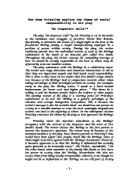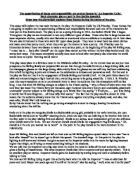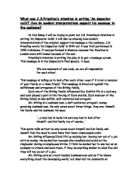"He inspected us all right..." Write an essay examining how one character is affected by the Inspectors visit.
English Essay: An Inspector Calls "He inspected us all right..." Write an essay examining how one character is affected by the Inspectors visit. The play "An Inspector Calls" was written in 1946 the playwright of this play was J.B Priestley, he had survived both world wars. He was a firm believer in socialism and capitalism. This play deals with the death and destruction that can be caused by both capitalism and socialism. The family were as solid as a rock before the inspector visited. The inspector was a destructive character for the Billings; however he is not portrayed to be a bad character. He is portrayed to be the truth finder and the fact that he is an inspector makes the audience aware of his authority. Sheila was brought up in a high middle class family background. She is used to the finer things in life as her family is rich. Her family lives in a "fairly large suburban house." Sheila is engaged to Gerald Croft, this engagement was more of a business merger than a marriage. Sheila's father is very business minded as he is a "hard nosed business man." In the play Mr Birling suggests the "Crofts and the Birling's are no longer competing but are working together." Before the Inspector came on his disastrous voyage through the Birling family, Sheila was cheerful and in high spirits. She was cheerful because she was to get married to a young and handsome Gerald
"How did the production convey J.B. Priestley's social message in 'An Inspector Calls' "?
GCSE ENGLISH - DRAMA COURSEWORK ASSIGNMENT By Charlotte Holt "How did the production convey J.B. Priestley's social message in 'An Inspector Calls' "? The production of 'An Inspector Calls' showed what J.B. Priestley thought of British society. The play could be seen on two different levels. One level is the fairly straightforward idea of 'whodunnit', the mystery story approach. On a more significant level, the play can be seen as a criticism of the way society is organised. Priestly, being a socialist, believed in equal rights and opportunities for everyone. He disapproved of the British class system and wrote this play, along with many others, to try and get across his socialist message. The play was written and set at two different times. It was written in 1945 at the end of World War two, but it was set in 1912 in the Edwardian period, just before World War One. His reason for doing this was that in Edwardian times, if you were poor, there was no one in society to help you. No NHS, low life expectancy, no Social Services - if you lost your house or had problems with children there wasn't any help. Education was not available to the poor as they were needed by their parents to work, Trade Unions were in their infancy - very new and weak organisations, and if you were treated unfairly at work or lost your job there was nothing to fall back on. Priestley set it at this
"How does J.B Priestley end each act on a note of high drama?"
English essay: "How does J.B Priestley end each act on a note of high drama?" Introduction The play starts off with the setting of an apparently normal family, the Birlings. They are celebrating Sheila Birling's engagement to Gerald Croft , the son of Mr Birling's friendly business rival. At first it appears as though nothing is wrong until an Inspector appears from seemingly no-where ,claiming to be investigating the suicide of a young girl. From this point on the tension in the play builds as one by one the characters are interogated by the Inspector.The highest points of tension are at the end of each of the three acts and Priestley does this in a number of different ways. Act one One of the first things Priestley does to set the scene would be the lighting.At first it would be bright and cheerful ,with colours such as white,yellow and pink.But as the play goes on and reaches the climax the lighting changes and thus does the mood of the audience. It is Birling's speech in Act 1 that sets the scene for the action in the play. Birling is confidently talking to Eric and Gerald about what he thinks about the future.He thinks of everything as though it is business and openly gives Eric and Gerald advice that every man has to look out for himself ,which may leave the audience wondering if this good advice or not. During the early stages of the first act Sheila hints at a
"How far is the Inspector an 'embodiment of a collective conscience' (Gareth Lloyd Evans)?" Consider the Ways in Which JB Priestley Develops the Inspector's Dramatic Impact in the Play
"How far is the Inspector an 'embodiment of a collective conscience' (Gareth Lloyd Evans)?" Consider the Ways in Which JB Priestley Develops the Inspector's Dramatic Impact in the Play In this essay I will consider the way in which JB Priestley presents the character of the Inspector and how he develops his role throughout the play. I will study the Inspectors role through each Act, in detail, and the effect of his presence and questioning on the Birling Family group. I will also look at how far Priestley displays the Inspector as 'an embodiment of a collective conscience'. In Act One, from the point of entry the Inspector begins to affect the family group. He enters at a critical point during Mr. Birling's speech when he sums up his ideas and thoughts on how "A man has to mind his own business and look after his own" (p.10). This speech shows Birling for who he really is; rather pompous, opinionated, bombastic and self-centered, and also makes the audience aware that he will be the main opposition to the Inspector. As soon as the Inspector enters the atmosphere of the room changes, Priestley shows in the stage directions that 'the lighting should be pink and intimate until the Inspector arrives, and then it should be brighter and harder'. This makes it seem as though the room and its occupants are moving from their delusional happiness about life and the engagement, more
"Inspector Calls" is about the discriminations between different classes and sexes.
AN INSPECTOR CALLS GCSE COURSEWORK ASSIGNMENT I think that an "Inspector Calls" is about the discriminations between different classes and sexes, it conveys a lot of messages about these topics and uses An Inspector - a mysterious, curt individual who makes an unexpected call on an upper middle class, very opinionated family named the Birlings. The inspector seems to invade their own little world - upsetting a celebration of theirs, forcing them to realise the truth - they all contributed to the death of a young, working class girl with what should have been years ahead of her, instead these were snatched away by a greedy, insensitive and selfish chain of events, all down to the Birlings. The girls name was Eva Smith. It is set just before the First World War, a time which is linked to one of the messages that the play delivers to the viewer in one of the final, most powerful, statements and at a time when class was very important, there was a clear divide between the working and upper classes, the working class being inferior, almost uncivilised or animals. I would want a large, open well-furbished and elegant dining room with a solid looking fairly ornate dining table in the centre of the stage. Some exotic plants such as small palm in the corner giving an individual air to a traditional setting. They might believe it sets them apart from other higher and lower
In what Way Does Priestly Present The Conflict Between The Classes In This Play?
In what Way Does Priestly Present The Conflict Between The Classes In This Play? I am writing an essay based on the title question" In what ways does Priestly present the conflict between the classes in this play "I am studying the text: "An Inspector calls" written by JB Priestly. I have organized my ideas in a detailed response. By first making a point then focusing on a quote from either of these pages: 2 and 46 and concluding with some analysis relating back to the essay question. I perceive Conflict as a disagreement, argument or battle. It can be perceived as either internal or external. Internal conflict is often conflict within an individual often emotional or turmoil, In comparison to external conflict, which is between individuals, groups or a society. Conflict is very important within a play as it depends on conflict and tension to involve it's audience, challenging and hiding their attention, because we are all experienced with some sort of tension in our lives. We are able to identify with the feelings of the characters we see before us even if the details of the situation are foreign to us. Alcohol is a theme introduced very early on in the play. Causing both internal and external conflict. Alcohol is first introduced by Birling. "Giving us the port Edna"(Pushing it to Eric) The fact that alcohol was introduced so early on in the play shows that conflict
Choose two contrasting characters in "an Inspector Calls" examine how they deal with the inspector's accusations of their guilt - Go on to consider how J B Priestley uses the play as a vehicle of social criticism.
An Inspector Calls Choose two contrasting characters in "an Inspector Calls" examine how they deal with the inspector's accusations of their guilt. Go on to consider how J B Priestley uses the play as a vehicle of social criticism. J B Priestleys "an Inspector Calls", written in 1945, is a well written play. It differs from other plays because the whole play is set in one setting (unity of actions) and has few characters and has no sub-plot. The main plot of the play is the death of Eva Smith and how the characters are linked to her death. J B Priestley encourages the audience to learn about responsibility and Social criticism in the performance. The characters reactions to the death of Eva Smith are important and often contrasting. The two contrasting characters that I have chosen are Mr Birling and Eric, his son. Mr Birling is the first of my contrasting characters. He is a snobbish, oaf of a man and enjoys putting down people of a lower social status. Mr Birling's relationship with Eva Smith was that Mr Birling was the manager of a factory that Eva Smith worked in as a machine worker. Eva Smith was the hard working type and not the rebellious type, until she came back from holiday. She started a strike for more money. This caused Mr Birling to fire her. The Sacking of Eva Smith cause the whole chain of events. Mr Birling is the fist person to be interviewed by the
Analyse the role that Inspector Goole plays in conveying Priestley's social message.
Analyse the role that Inspector Goole plays in conveying Priestley's social message. In the play, the final words of the inspector indicate clearly Priestley's message. The purpose of this speech is to leave the Birlings with an overwhelming feeling of guilt, so they realise what they have done and mend their ways before another tragedy like this occurs again. He says that everybody is "responsible for each other" and that the "millions and millions and millions of Eva Smiths and John Smiths" all count as people. This is Priestley's social message to the audience and to the Birlings. The Inspector tells the Birlings that if man will not learn this lesson "then they will be taught in fire, blood and anguish" The events led by the inspector between the two speeches, and the last speech together give the audience a clear idea of his message One of the methods the inspector uses to reinforce J.B.Priestley's message of the play is the way that the inspector repeatedly comments and reminds us of the horrible ordeals Eva Smith went through. "Burnt her insides out of course" The inspector here emphasises the point that Eva died in "great agony". This allows the Birlings and the audience to create sympathy with Eva, helping them to realise what it was like for a working class woman to succeed in society. After Eva had finished with Gerald, we are told that she went to a
Inspector Calls - Sheila Birling character review.
Inspector Calls Sheila Birling- The character Sheila Birling is the daughter of Author and Sybil Birling. In the story Priestly portrays her as a young beautiful lady with a rather selfish and arrogant nature. Using her compelling personality she is able to obtain anything in which she desires through her father. After the inspector explains what's happened and how Eva Smith dies she shows an empathetic side of her personality, which might have surprised the audience watching the play. She shows her remorse by describing her feelings towards the injustice of the case. The inspector interviews Author Birling first before moving on to Sheila. Author Birling insists for the inspector to leave his daughter out his inquiries, but the inspector points out to Mr Birling that he must speak to everybody in the house. The inspector unveils Sheila's' involvement by revealing her as the second link in a long chain of events leading to the death of Eva Smith. Edwardian upper class society was well renowned for their ability to exercise total power and control over lower class persons. Priestly shows a perfect example of this during the inspector's questioning of Sheila. He reveals that after being sacked from Mr Birlings' factory, Eva Smith found a knew line of work at a clothes shop where Sheila Birling was considered a valued customer. Eva Smith was soon left unemployed after being
inspector calls, dramatic devices alcohol
Discuss how J.B Priestly uses alcohol as a dramatic device to explore themes of morality and responsibility in the play 'An Inspector calls'? The play an inspector calls was first performed in 1946, set in 1912 (Edwardian era), in the midlands. The play is initially a battle ground of socialist and capitalist systems, cleverly implemented into the typical society with the lives of the Birling family. Through reading the play and studying its content, one can easily understand Priestley's socialist discontentment, in the structure of society. Throughout the play, we can see the message that is being put across to the audience. Priestley expresses his views, through the characters, dramatic devices exploring themes of responsibility and morality; areas in which he believes are corrupt. The characters are virtually an embodiment of his ideas; he shows corruption through the mockery of society, how capitalist beliefs are destroying society and how socialist views will help society prosper. Through this, he shows the true condition of what lays behind the cloud which we think is full of happiness and richness yet there is an unprincipled, decadent society where there is no love between them. A technique of communication was the use of dramatic devices. Priestly uses alcohol to convey his message in the play. Although this may sound absurd, but I feel it is quite intelligent



























